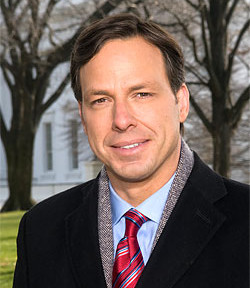First, for the good journalism, which I will quote at length (think of it as a counterexample to yesterday’s post about Jake Tapper’s misconception of media fairness):
Does any journalist who is not an overt shill for the right actually believe that Republicans are pushing voter ID laws because they’re concerned about voter fraud?
No, of course not.
And for good reason. Voter fraud simply isn’t a problem in this country. Studies have definitively debunked the voter fraud myth time and again.
In Pennsyvlania, which just adopted a tremendously restrictive photo-ID law that could disenfranchise 1 in 10 voters, state officials conceded they have no evidence of voter fraud, nor any reason to believe it could become a problem…
And the pursuit of this goal ostensibly in the name of voter fraud is an outrageous deception that only works if the press is too timid to call it what it really is.
For reporters to treat this issue like just another political squabble is journalistic malpractice. Indeed, relating the debate in value-neutral he-said-she-said language is actively helping spread the lie. After all, calling for someone to show ID before voting doesn’t sound pernicious to most people, even though it is. And raising the bogus issue of voter fraud at all stokes fear. “Even if you say there is no fraud, all people hear is ‘fraud fraud fraud’,” said Lawrence Norden, a lawyer at the Brennan Center for Justice at New York University School of Law.
Think about it. If you were covering elections in another country, and one political party was actively trying to limit voting in the name of a problem that objectively didn’t exist, would you hesitate for a moment to call out that tactic — and question that party’s legitimacy? Hardly.
Modern American journalists strive for impartiality, but there is a limit. Mainstream journalists shouldn’t be afraid of being accused of taking sides when what they’re doing is standing up for basic constitutional rights. Indeed, the greater danger is that readers condemn them — or even worse, stop paying attention to them — for having no convictions at all, and no moral compass.
The GOP has taken increasingly radical positions, confident that the media’s aversion to taking sides will protect it from too much negative coverage. But failing to call out the voter ID push is like covering the civil rights movements and treating “separate but equal” as if it was said with sincerity.
And now, for the bad writing (on the part of Lehrer, not Moynihan):
Yesterday, Lehrer finally confessed that he has never met or corresponded with Jeff Rosen, Dylan’s manager; he has never seen an unexpurgated version of Dylan’s interview for No Direction Home, something he offered up to stymie my search; that a missing quote he claimed could be found in an episode of Dylan’s “Theme Time Radio Hour” cannot, in fact, be found there; and that a 1995 radio interview, supposedly available in a printed collection of Dylan interviews called The Fiddler Now Upspoke, also didn’t exist. When, three weeks after our first contact, I asked Lehrer to explain his deceptions, he responded, for the first time in our communication, forthrightly: “I couldn’t find the original sources,” he said. “I panicked. And I’m deeply sorry for lying.”
I don’t join the stampede of writers and journalists jumping up and down on Jonah Lehrer’s grave out of a barely concealed sense of schadenfreude. The amount of pressure and panic that he must have felt in order to do this had to have been immense. That doesn’t excuse it. But it certainly isn’t cause for celebration by anyone else either.
Related articles
- Jonah Lehrer, Caught Making Up Bob Dylan Quotes, Resigns From The New Yorker (nymag.com)
- Ahead Of Voter ID Trial, Pennsylvania Admits Voter Fraud Doesn’t Exist (alan.com)
- Froomkin to media: Tell people the truth about voter ID laws (crooksandliars.com)
- Pennsylvania: No Proof of Voter Fraud (drudge.com)
- It’s Hard Out There for a Plagiarist (theatlanticwire.com)
- South Carolina Attorney General Admits Voter ID Won’t Prevent Voter Fraud (thinkprogress.org)
- Pa. Won’t Use Voter Fraud Argument At Hearing Over ID Law (npr.org)
- Pennsylvania admits there has been no voter fraud (dailykos.com)
- Pennsylvania: No In-Person Voter Fraud Either Now or Anytime in the Past (motherjones.com)


